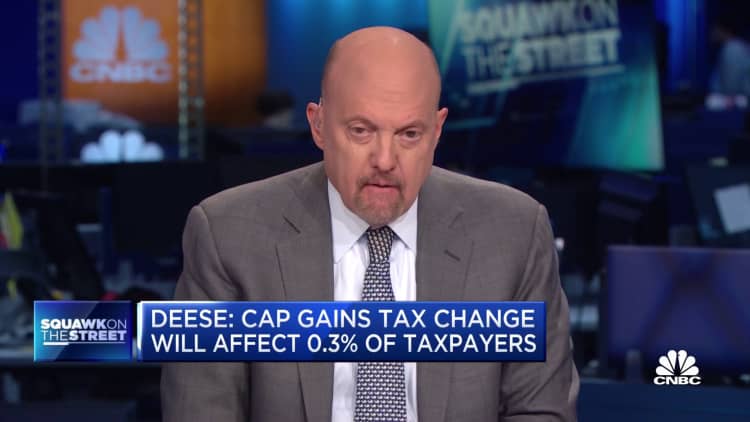As home prices soar, some sellers in red-hot markets may face a costly surprise come tax time.
President Joe Biden will propose in a nationwide address Wednesday a capital gains tax increase for the top 0.3% of households — those making more than $1 million per year.
But the proposal may also deliver a tax bill to those selling a home with significant gains.
Wealthy Americans now paying the top capital gains rate could see a hike to 43.4%, from 23.8%. Both rates include a 3.8% levy on net investment income, created by the Affordable Care Act.
The tax increases may impact more than stocks, bonds and cryptocurrency, however. Homeowners looking to cash in on sizzling home prices could also receive a bill.
"The proposed increase in federal as well as state capital gains tax rates could sting [home sellers] on the margins," said certified financial planner Sharif Muhammad, founder and CEO of Unlimited Financial Services in Somerset, New Jersey.
Tax exclusion
Even with median home prices reaching all-time highs, Muhammad said, many sellers avoid paying capital gains on home profits because of a special tax break.
Single taxpayers can subtract up to $250,000 from their profits, and married filers may qualify to exclude up to $500,000. Anything more is subject to capital gains taxes.
There's a strict IRS rule, though: It must be the seller's primary home for two out of five years before closing on the sale, with a few exceptions, like a job- or health-related move.

While many can save on capital gains taxes, home sales in high-dollar markets could bump some sellers over the $1 million income threshold in the year of the sale, especially without the exclusions.
"I don't expect the law to impact a lot of people, but selling in some markets could put someone over $1 million in income for the year," said Leona Edwards, a Nashville, Tennessee-based CFP and wealth advisor at Mariner Wealth Advisors.
The Los Angeles area, for example, has seen a year-over-year increase of 24.8%, with the median list price at $1,199,000, according to data from realtor.com.
Make sure you're planning things out with enough lead time to help offset the windfall and potential tax ramifications.Sharif MuhammadUnlimited Financial Services
Those who bought during dips over the past 20 years, like after the Great Recession, may be caught up in the tax hike.
For example, let's say a single home seller earns $200,000 per year. If they bought a home for $250,000 and sold for $1.5 million, they could have annual income above the $1 million threshold, even with the $250,000 exclusion.
Combined with state taxes, the total capital gains rate could be more than 50% in California, a Tax Foundation report estimates.
Proactive tax planning
Although some sellers may receive a bill, there are ways to reduce the burden.
Before making a move, Edwards said, follow the exclusion rules when timing the sale.
"You may get burned when you keep a home as a rental property and sell later on," she said.
Muhammad said sellers might slash their bill with so-called tax-loss harvesting, which uses some investment losses to offset gains.
Sellers may also consider home improvements they have made, like renovations, that can reduce profits by increasing the home's original purchase price, known as the "cost basis."
Tax planning shouldn't happen in a silo, however.
"Make sure you're planning things out with enough lead time to help offset the windfall and potential tax ramifications," he said.






